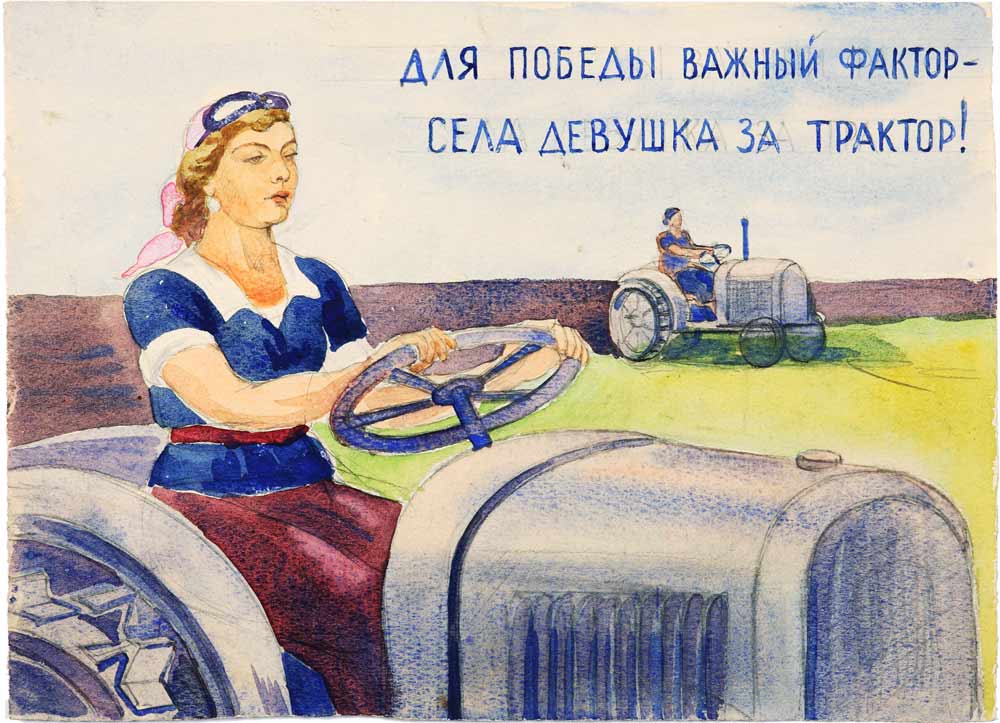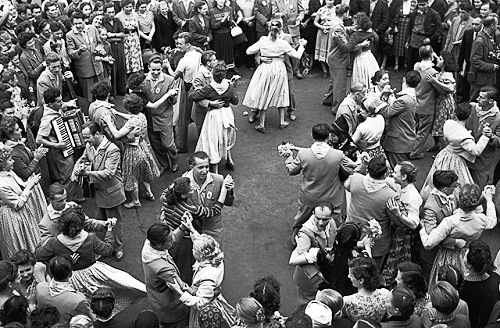Gender History of the Soviet Union
Section outline
-
 Thursdays 17:30 – 19:05 via Zoom due to COVID
Thursdays 17:30 – 19:05 via Zoom due to COVIDZoom registration: https://cesnet.zoom.us/meeting/register/tJYoc-GrrjopGNaYPtvudqQ7-zPAt-8CBYhW
This course introduces students to major themes in the field of Soviet women’s and gender history. Covering the period from the revolution to the collapse of the country, the course examines experiences, identities and gender relations.
Among many topics, the course will explore issues such as work, family roles, maternity, fatherhood, sexuality, sex-work, abortion, political engagement, gender representations in posters and films, etc. Students will be marked by their participation, presentation and final essay.
All readings are in English. It is absolutely mandatory to read all articles posted below for every class. During the class we will discuss them.
Requirements and Grading
Undergraduate Students
A. Class Participation: 10%
B. Presentation: 15%
C. Book Review: 25% (due 13 May)
D. Final Paper (2000 words +-10%, due 10 June): 50%Graduate Students
A. Class Participation: 10%
B Presentation: 15%
C. Book Review: 25% (due 13 May)
D. Final Paper (3000 words +-10%, due 10 June): 50%A. Participation is evaluated on the following criteria:
- providing meaningful discussion questions;
- contribution to the weekly seminar discussions.
All students have to send 3-5 discussion questions based on the readings 2 hours before every class. These questions are also considered as part of participation.
B. Presentation: each student is required to have a class presentation for one of the weekly seminars of their choice. The presentation is maximum 10 minutes long.
C. Book Review: each student will write one book review.
The selected book must be approved by the instructor. The length of the review is 650-750 words.
D. Final paper: The final paper discusses one question, provided by the instructor or chosen by a student in consultation with the instructor. It is based on primary sources (most likely in translation) or secondary sources (in this case, you are expected to engage the historiography of the issue).The length of the paper is 2000 words for undergraduate and 3000 words for graduate students.
The final paper should be seen as a research project, discussing a question/problem in an original way.
The question and the primary and secondary sources must be analysed critically, focusing on your arguments. Please feel free to consult the instructor during the entire process.
Experiential Learning:
During the discussions, we will aim to combine direct experience with focused reflection on the course readings. We will build on past knowledge and experiences, always striving to foster critical thinking. Besides the required readings from this outline, we will listen to oral history accounts, read (translated) primary sources, watch films (with subtitles), and analyse other sources such as images and posters.
Aiming to maximise the student’s learning outcomes, graduate students can also suggest alternative tasks that could contribute to their final dissertation.
Presentations Noticeboard:
4 March - Ekaterina Buianova and Daria Filippska (Religion and Gender); Karin Spišáková (Zhenotdel)
11 March - Edwards Jayson Aquila Kwaku and Emma Hurson (on prostitution)
18 March - Szymon Gasiorowski (Women Employment and Stalinism); ; 2 potential slots
25 March - Katarzyna Karpińska (Racism); Gabriela Grzelak (Roma in the SU); 1 potential slot
8 April - Igor Kolmakov (Gender and Muslim Communities); Jaspreet Sahota
15 April - Alexandra Geints and Ada-Louise Voituriez (on same-sex desire); Agata Rybka (on transgender); Tatsiana Biruk (on homosexuality)
22 April - Diane Juliette Gabriel-Charmant and Maria Glowacka(on youth sexuality); 1 slot available
29 April - Valentina Carnali and Anhelina Pryimak (on abortion); 1 potential slot
6 May - Anastasia Łoś (the second shift); 1 potential slot
13 May - Ivan Posylny (on gender roles, bullying and stereotypes); Valentina Bagozzi (religious feminism); Veronica Dohme (late Soviet, early Russian feminisms);
20 May - Available 2 slots -
- Scott, Joan W. “Gender: A Useful Category of Historical Analysis.” The American Historical Review 91, no. 5 (December 1986): 1053–75.
- Fraser, Erica L. “Gender and Sexuality in Russian History: New Directions.” Journal of the Canadian Historical Association 25, no. 2 (September 2, 2015): 319–28.
-
- Wood, Elizabeth A. The Baba and the Comrade: Gender and Politics in Revolutionary Russia. Bloomington, IN: Indiana University Press, 1997. 13-48
- Goldman, Wendy Z. Women, the State, and Revolution: Soviet Family Policy and Social Life, 1917–1936. Cambridge; New York, NY: Cambridge University Press, 1993. 1-13; 29-58.
- Podcast: BBC Witness History: The Original Revolutionary Feminist (12 mins)
-
- Gorsuch, Anne E. “‘A Woman Is Not a Man’: The Culture of Gender and Generation in Soviet Russia, 1921-1928.” Slavic Review 55, no. 3 (October 1, 1996): 636–60.
- Goldman, Wendy Z. Women, the State, and Revolution: Soviet Family Policy and Social Life, 1917–1936. Cambridge; New York, NY: Cambridge University Press, 1993. 101-143

-
- Hearne, Siobhán. “From Liberation to Limitation: The Early Soviet Campaign to “Struggle with Prostitution.” In The Fate of the Bolshevik Revolution: Illiberal Liberation, 1917-1941, edited by Lara Douds, James Harris, and Peter Whitewood. London: Bloomsbury, 2020.
- Prostitutka, Film (77 mins)
-
- Goldman, Wendy Z. Women, the State, and Revolution: Soviet Family Policy and Social Life, 1917–1936. Cambridge; New York, NY: Cambridge University Press, 1993. 296-336
- Hoffmann, David L. “Mothers in the Motherland: Stalinist Pronatalism in Its Pan-European Context.” Journal of Social History 34, no. 1 (October 1, 2000): 35–54.
- Schrand, Thomas G. “Socialism in One Gender: Masculine Values in the Stalin Revolution.” In Russian Masculinities in History and Culture, edited by Barbara Evans Clements, Rebecca Friedman, and Dan Healey, 194–209. Houndmills; New York, NY: Palgrave, 2002.

-
- Keys, Barbara. “An African‐American Worker in Stalin’s Soviet Union: Race and the Soviet Experiment in International Perspective.” The Historian 71, no. 1 (March 1, 2009): 31–54.
- Cirkus, film (87 mins)
-
- Edgar, Adrienne. “Bolshevism, Patriarchy, and the Nation: The Soviet ‘Emancipation’ of Muslim Women in Pan-Islamic Perspective.” Slavic Review 65, no. 2 (July 1, 2006): 252–72.
- Northrop, Douglas. “Subaltern Dialogues: Subversion and Resistance in Soviet Uzbek Family Law.” Slavic Review 60, no. 1 (2001): 115–39.
- Yusufjonova-Abman, Zamira. “State Feminism in Soviet Central Asia: Anti-Religious Campaigns and Muslim Women in Tajikistan, 1953–1982.” In The Palgrave Handbook of Women and Gender in Twentieth-Century Russia and the Soviet Union, edited by Melanie Ilič, 299–314. New York, NY: Palgrave Macmillan, 2018.
- Podcast: BBC Witness - The last of the Kazakh herders (9 mins)
https://www.bbc.co.uk/sounds/play/w3cszms9

-
- Healey, Dan. Homosexual Desire in Revolutionary Russia: The Regulation of Sexual and Gender Dissent. Chicago: Univ. of Chicago Press, 2001. 126-151, 181-204
- Alexander, Rustam. “Sex Education and the Depiction of Homosexuality Under Khrushchev.” In The Palgrave Handbook of Women and Gender in Twentieth-Century Russia and the Soviet Union, edited by Melanie Ilič, 349–64. New York, NY: Palgrave Macmillan, 2018.
- Stella, Francesca. Lesbian Lives in Soviet and Post-Soviet Russia: Post/Socialism and Gendered Sexualities. Genders and Sexualities in the Social Sciences. New York, NY: Palgrave Macmillan, 2015. 45-66
Optional podcast: NBN Interview with Dan Healey (56 mins)
-
- Roth-Ey, Kristin. “‘Loose Girls’ on the Loose?: Sex, Propaganda and the 1957 Youth Festival.” In Women in the Khrushchev Era, edited by Melanie Ilič, Susan Emily Reid, and Lynne Attwood, 75–95. Studies in Russian and East European History and Society. Houndmills; New York, NY: Palgrave Macmillan, 2004.
- Livschiz, Ann. “Battling ‘Unhealthy Relations’: Soviet Youth Sexuality as a Political Problem.” Journal of Historical Sociology 21, no. 4 (December 2008): 397–416.
- Podcast: BBC Witness - The USSR Opens Up to the West (9 minutes)
https://www.bbc.co.uk/programmes/w3cswsgc

-
- Nakachi, M. “N. S. Khrushchev and the 1944 Soviet Family Law: Politics, Reproduction, and Language.” East European Politics and Societies 20, no. 1 (February 2006): 40–68.
-
Burton, Chris. “Minzdrav, Soviet Doctors, and the Policing of Reproduction in the Late Stalinist Years.” Russian History 27, no. 1 (January 1, 2000): 197–221.
Optional podcast: Dig: A History Podcast - Communism and Uteruses (46 mins)
-
- McCallum, Claire E. “Man About the House: Male Domesticity and Fatherhood in Soviet Visual Satire Under Khrushchev.” In The Palgrave Handbook of Women and Gender in Twentieth-Century Russia and the Soviet Union, edited by Melanie Ilič, 331–47. New York, NY: Palgrave Macmillan, 2018.
- Jacobs, Adrianne K. “Love, Marry, Cook : Gendering the Home Kitchen in Late Soviet Russia.” In Seasoned Socialism: Gender and Food in Late Soviet Everyday Life, edited by Anastasia Lakhtikova, Angela Brint-linger, and Irina Glushchenko, 33–58. Bloomington, Indiana: Indiana University Press, 2019.
- The Office Romance, film (156 mins)
-
- Ruthchild, Rochelle. “Feminist Dissidents in the ‘Motherland of Women’s Liberation’: Shattering Soviet Myths and Memory.” In Women’s Activism and “Second Wave” Feminism: Transnational Histories, edited by Barbara Molony and Jennifer Nelson, 99–122. London ; New York: Bloomsbury Academic, An imprint of Bloomsbury Publishing Plc, 2017.
- Lipovskaia, Ol’ga. “The New Women’s Organisations.” In Perestroika and Soviet Women, edited by Mary Buckley, 72–81. Cambridge ; New York: Cambridge University Press, 1992
Optional podcast: The Documentary BBC - The Soviet Feminist Army (27 mins)
-
- Porteous, Holly. “‘A Woman Isn’t a Woman When She’s Not Concerned About the Way She Looks’: Beauty Labour and Femininity in Post- Soviet Russia.” In The Palgrave Handbook of Women and Gender in Twentieth-Century Russia and the Soviet Union, edited by Melanie Ilič, 413–29. New York, NY: Palgrave Macmillan, 2018.
- Podcast: BBC Witness - No Sex in the USSR (12 mins)